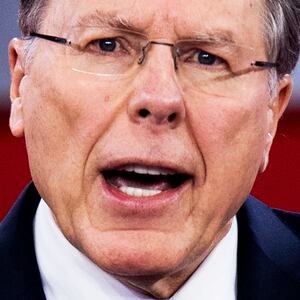In the wake of the shooting at Sandy Hook elementary school in December 2012, the National Rifle Association launched a grant program that it said would be instrumental in protecting students from gun violence.
The School Shield Emergency Response Program was touted as a way to help provide schools with everything from “armed security to building design and access control to information technology to student and teacher training.” And in the subsequent years, the gun lobby continued to push the idea as school shootings became more frequent.
“When People Cried, ‘Someone Do Something!’ We Did,” The NRA declared on its website. School Shield, it added, was “A Program Whose Time Has Come.”
ADVERTISEMENT
But as the gun group promoted School Shield, questions mounted about how far-reaching the program actually was. And now, one of the NRA’s longtime vendors is claiming that the gun-rights group artificially boosted their fundraising numbers by raising money for its School Shield program while paying out only a small number of actual grants.
In an amended counterclaim filed in Texas federal court in November, the NRA’s former ad agency—Ackerman McQueen—says that the gun lobby used School Shield as a “shell” program that it did not intend to meaningfully execute.
The longtime NRA leader Wayne LaPierre, the counterclaim alleges, “boosted NRA revenue through the creation of shell programs” like School Shield, “that the NRA never had any intention or meaningful ability to execute (or execute competently).”
All told, Ackerman McQueen claimed the NRA only gave a “paltry” five grants to schools between 2012 and 2014. That revelation matches reporting from Mother Jones, which revealed that the NRA’s tax returns from 2013 to 2016 showed only three grants given to schools on behalf of the School Shield program—totaling up to $200,000.
The lack of grants were, apparently, a subject of concern internally. When Oliver North became the NRA’s president in May 2018, the counterclaim alleged he “demanded” that the NRA “make [the program] real.” The gun group announced later that year that it had given 54 grants totaling over $600,000 to public and private schools in 23 states. The program is still active, recently giving a $21,000 grant to a Missouri school.
School Shield isn’t the only program that Ackerman McQueen says was used as a shell for the NRA to raise more money. According to its counterclaim, the NRA also used its Carry Guard insurance program as a vehicle to bring in more cash without providing much benefit for its members. The program was unveiled in 2017, and offered members insurance-backed criminal and civil liability protection. It also offered three levels of concealed carry gun training before shutting down earlier this year.
The counterclaim alleged that Josh Powell, the senior NRA official responsible for Carry Guard’s development, “seemed generally dismissive of the training component of the program and kept referring to Carry Guard as nothing but an ‘insurance scheme.’” The ad firm said it resisted promoting the program until the NRA could deliver on their promises to members, and expressed that it wanted nothing to do with the so-called “scheme.”
“By appealing to members’ hearts or promising benefits that were never delivered, the NRA raised millions of dollars of ‘funny money’—LaPierre’s affectionate term for brand sponsorship funds,” the counterclaim reads.
The counterclaim makes additional claims about Youth for Tomorrow (YFT)—a Christian organization where LaPierre’s wife, Susan, was president. The gun group has been scrutinized for its lack of transparency in donations to YFT before, with a report from The New Yorker and The Trace revealing that over $180,000 in NRA contributions to YFT went unreported in their tax filings. According to Ackerman McQueen, the NRA also hid donations to YFT by using another entity, stating that it used a “third-party charity”, which would then give the NRA’s money to YFT. The counterclaim did not name the alleged “third-party charity” used by the NRA.
The ad firm said this arrangement was part of “‘back-scratching’ relationships” LaPierre structured to “siphon money to pet projects that the NRA would otherwise be prohibited from contributing to.”
Ackerman McQueen’s counterclaim comes as the ad agency and the NRA are currently locked in a bitter legal battle. The gun group first sued Ackerman McQueen, claiming it was unable to provide adequate documentation for its bills to the group. The ad firm sued back, and said it complied with the gun group’s records requests. The firm also claimed that the NRA was attempting to terminate the contract between them. Both entities are seeking tens of millions from each other.
“It’s disappointing, but not surprising, that Ackerman’s response to the agency’s legal issues is to attack a service program supported by many members of law enforcement and school officials across the country,” Andrew Arulanandam, the managing director of NRA Public Affairs, said in a statement. “We take great pride in NRA School Shield—and thank our many loyal members who join us in the effort to keep our children safe.”
The gun group's lawyers also said the counterclaim represented “another desperate chapter in the agency’s smear campaign” against them.
A representative for North declined to comment, and Ackerman McQueen’s lawyers did not respond to a request for comment.
Ackerman McQueen’s counterclaim was filed after the NRA launched a lawsuit against the ad firm in U.S. District Court in Texas. The two parties are also involved in a lawsuit in Virginia. The filing—which accuses the NRA of libel and LaPierre of libel and fraud—also includes previously reported claims of LaPierre hiding his personal expenses within the ad firm. In the NRA’s initial complaint, the gun group accused Ackerman McQueen of fraud, conspiracy, breaches of fiduciary duties, and others.







